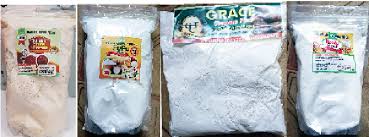
Unregistered packaged foods flood markets as regulatory agencies struggle
A trader in his late thirties named Mr John Udom was tending to the numerous patrons at a crowded temporary stall in Oyingbo Market, Lagos, which is well-known for its enormous sales of food goods.
Using a clever combination of humour and savvy negotiating, he gave each customer confidence that their goods will meet their needs.
Following a few minutes of animated haggling with the other patrons, he turned to face our journalist and asked again what would be bought.
Our correspondent asked for multiple brands of packed powdered papas and flours (cassava and corn).
Udom handed the order to his shop assistant who was positioned in the interior sections of the store, appearing happy to receive a customer with several orders.
Soon later, the things were delivered and the trader listed the prices of each item.
In a bid to confirm the correctness of the product, this correspondent carefully perused each item for the brand’s name and product labelling, which includes, the declaration of content of ingredients under composition, expiry or best before and manufacture dating as well as the batch or lot numbers.
According to the Pre-Packaged Food, Water and Ice (Labelling) Regulations 2019 of the National Agency for Food and Drug Administration and Control, it is prohibited to manufacture, import, export, distribute, advertise, sell or use a pre-packaged food without a date marking, batch number, registration number, name of the food, brand name, labelling information, list of ingredients, name, address and contact information of the manufacturer or distributor, among other requirements.
Date marking involves a legible display of “the day, month and year of manufacture on the label; when a food must be consumed before a certain date to ensure its safety and quality the “Use-by Date” or “Expiration Date”, the “Best-Before Date” or “Best Quality Before Date” shall be declared.”
Missing NAFDAC REG NO
Still at Udom’s store, this correspondent discovered that almost all the packaged items lacked a NAFDAC Registration Number, the manufacturer’s details, except cell phone numbers.
The NAFDAC REG NO or NRN is a unique registration number or certificate of registration issued after a product has passed the quality and standard test carried out by the agency.
After the discovery, this correspondent told Udom that the items lacked the numbers.
For example, the powdered pap and fufu (cassava flour) produced by Madam Aloevera Foods, had no NRN and no product details, except an address of No 1, Market Street, Oyingbo, Lagos State and a phone number.
A check of NAFDAC’s registration site for the food product brought the result, “No matching records found.”
Cocoyam flour
Surprisingly, Udom’s response showed that he was aware he displayed and sold a range of unregistered products and that such action was a crime prohibited under the NAFDAC Drug and Related Product Labelling Regulations, 2019.
Defending his actions, Udom stated that he chose that path because of the lucrative nature and that the cumbersome process of product registration with NAFDAC forced many traders to sell unregistered products.
The trader would later tell our correspondent that he also produces a cocoyam powder under the brand name, “Grace Cocoyam Flour.”
As it is with Madam Aloevera Foods, it’s the same with Grace Cocoyam flour.
According to Udom, he applied for product registration with the regulatory agency in 2022, but he gave up when he was told he needed to have an apartment for a business that was separate from his home.
The school dropout added that the registration procedure was costly and time-consuming, adding that a lengthy list of prerequisites frequently pushes struggling traders to postpone registration until later.
NRN specifications
According to NAFDAC's official website, if there are no delays in the procedure, product registration for food goods takes about 90 days, and for medications, it takes about 120 days.
The applicants are required to provide all necessary documents, an application letter following NAFDAC’s rules, relevant information and a description of the facility and send samples of the items for laboratory analysis and ensure all required payments were made promptly.
Regarding Compliance Directives, NAFDAC requires clients to comply within seven days of issuance and failure may result in the cancellation of the application. Any delay caused by the client will not be counted within the 90-day registration period.
“All registration processes with timelines start with the submission of application (0 days); document verification (10 days); facility inspection/sampling for food (10 days), 20 days for drugs; laboratory analysis for food (30 days), and 40 days for drugs. Final vetting (10 days) and approval meeting/issuance of NAFDAC registration number for 20 days,” the statement added.
Voyage of more discoveries
After the encounter with Udom, our correspondent investigated several markets to uncover more of these unregistered food items.
Among the products found and purchased by our correspondent as proof include unregistered guinea corn pap powder (330g); beans flour (500g); cassava flour (fufu 500g); and cocoyam flour.
Cassava flour
Others are basmati long grain rice (1kg) for people living with diabetes; oats; soybean powder; cornflakes and coco balls for children.
Our correspondent learnt that consumers of these products are often unaware of their ingredients, which poses serious health risks, especially for under-five children.
Findings revealed that many households are now less concerned with NAFDAC registration numbers and expiration dates, but continue to patronise unregistered products due to their affordability.
Experts have also warned against the proliferation and indiscriminate consumption of these products, cautioning that they are potential dangers to humans.
Despite these warnings, it was observed that unregistered products are still widely available in various Lagos markets as well as on numerous online platforms.
Consumers unconcerned with NRN
Continuing, Udom, who also sells powdered fufu and cocoyam at Oyingbo Bus stop, said, “Our customers know that our products are genuine and that is why they patronise us.
“Also, many of them confirmed that our products are even better than some branded ones, yet the branded products are more expensive.
“The consumers are looking for cheaper products that would give them equal or better satisfaction than those of well-known brands.
“I tell you that most people who buy pap, fufu, or cocoyam flour from me don’t look at the products twice, especially the cocoyam.
“Their concern is whether it can thicken their soup and not NAFDAC number or fake. The situation in the country does not allow anybody to spend money unnecessarily.
“A bucket of cocoyam is now N3,200, then compare it with the ones we sell for N100,” he said.
Udom, who voiced his frustration with the prevailing economic hardships, noted that many of his customers no longer prioritise NAFDAC registration numbers or expiration dates on products.
He noted that those struggling to feed themselves are not checking expiration dates or NAFDAC numbers; they take whatever is available.
"The people who care about the kind of information you're looking for are only those who can afford fine dining. Nigerians are suffering so much that there is little to no time or space for these kinds of things.
He continued, "So, rest assured that my products are authentic; I will register them when I have the money."
Baby had food poisoning
The world seemed to have fallen apart for 32-year-old Aaka Igwemba after her six-month-old son ate an unauthorised custard sachet.
Her son began experiencing nausea and vomiting along with a fever a few hours after consuming the custard, indicating a decline in his health.
The first-time mother, who is married to Balogun trader Kingsley, was afraid for her unborn child's life, but prompt action—including the prescription of a nearby pharmacist—saw to it that her infant's condition was stabilised.
Igwemba was later told that her son had suffered from food poisoning; potentially, due to contamination from the goods, as a result of unclean handling that defined unregulated products.
The Anambra-born undergraduate avoided all unregistered products and custard brands, whether sachet or tin, during her child's early years after that terrifying encounter.
As she gained experience, it became clear to her why NAFDAC forbade the purchase or consumption of unregistered and unhealthy goods.
She now counsels moms not to give their kids—especially young ones—any goods whose origins are unclear.
product details and NAFDAC registration numbers before purchasing any product for human consumption.
‘My children suffered diarrhoea’
In a similar development at the Trade Fair Complex, a mother of three, Blessing Okafor, vowed never to buy unregistered food for her children after they suffered diarrhoea and dehydration stemming from the consumption of unregistered food.
Okafor, who lives at Abule-Osun, Lagos, told our correspondent that her neighbour,





